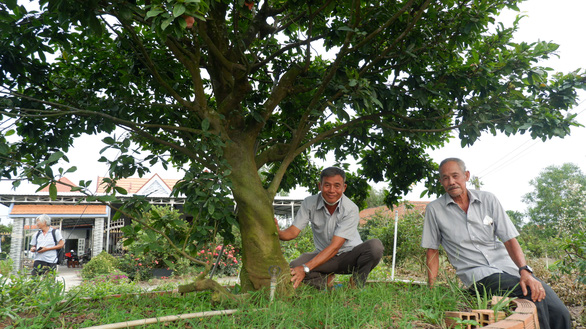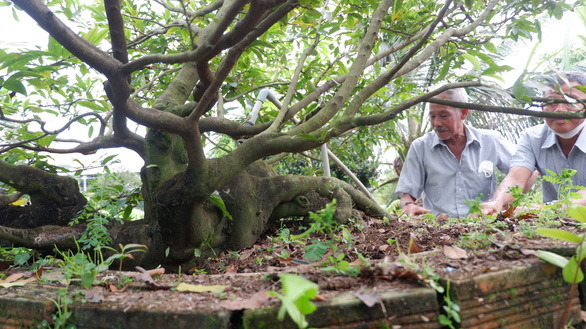The craft of tending to majestic, decades-old yellow apricot trees -- the harbinger of spring -- has made once poor rice farmers in the Mekong Delta province of Long An some of the richest people in town.
Though yellow apricot trees can be seen blossoming all year round in different areas of Vietnam, mostly in the southern region, the trees, together with cherry blossoms, have long been considered harbingers of spring.
The perennial trees are now big money for artisans in Tan Tay Yellow Apricot Tree Village, tucked away in the namesake commune in Thanh Hoa District after they made a bold switch from much less lucrative rice farming to tree farming just ten years ago.
The men are eagerly awaiting the moment their prized trees will draw throngs and scoop up whopping sums at the last minute, as they go on sale at spring flower markets which open every year prior to the Lunar New Year (Tet) holiday.
This year's Tet festival is due around late January and early February, with flowers to be displayed on the streets and in households as festive decorations.
Perfect workings of nature
Enthralled by the magic of apricot flowers, these exceptional artisans are breaking new ground and making a difference in their area of expertise.
The Tet botanical products from Tan Tay Village, located at Kilometer 22, National Highway 62, have made their way into better-off households as floral decorations and are a perfect fit for the special occasion in recent years.
As Tet nears, a Tuoi Tre (Youth) newspaper correspondent visited 74-year-old Tran Van Vi, or Hai Vi, who, according to Nguyen Van Hoang, head of Tan Tay Apricot Village’s representative board, is the trailblazer of the switch to raising apricot trees.
Vi is quite laid-back and humble about what makes him who he is now.
“I only have four acres [one acre is equivalent to approximately 3,600 square meters],” the veteran artisan said from his dwelling, surrounded by lush apricot trees, while refuting rumors that he has pocketed around one hundred billion dong (VND1 billion = US$44,045) from his apricot growing business.
He takes great pride in his treasured trees.
He said he has been offered several billion dong for some of them, but he has refused it.
From Hoang’s accounts, Vi’s apricot agribusiness all started out when the latter’s seventh child, Tran Van Thong, picked up ornamental floriculture skills in 1999 from artisans in long-existing Cho Lach Flower Village, Ben Tre Province, also located in the Mekong Delta.
Trained properly in nursery operations and with good planting techniques and materials readily available, Thong gave a first shot at establishing his own agribusiness by growing dozens of mai thom (apricot blossoms with a unique fragrance) trees in front of his home on seeds from Cho Lach Flower Village.
A dozen of the trees sold for a total of VND480 million (now $21,135) in 2005, Hoang added.
It was only then, according to Hoang, that local farmers realized the astonishing value of the low-maintenance ornamentals that provide stunning blossoms.
Realizing the great demand for the ornamentals, other farmers soon jumped on the bandwagon.
Touched at the memory of his resourceful son who passed away prematurely due to illness, Vi said he remembers the first days well.
“VND480 million was a huge sum back then. I don’t remember the exact number of trees sold then, but about more than ten,” Vi recalled.
The highly lucrative sale held hints for the future and prompted Vi and his other children to quickly fill their gardens with the fragrant, flamboyant flowering trees.
The seasoned farmer conducted pilot farming of the new variety on a frame to see whether the soil and weather of the Mekong Delta region are suitable.
The first days were not easy.
Vi shared his family’s plan to switch from rice and cajuput farming, which local farmers have long been used to, met with objections.
|
|
| In addition to their stunning growth speed, yellow apricot trees in Tan Tay Apricot Village, Long An Province, Vietnam all grow healthy and boast unique bases. Photo: Son Lam / Tuoi Tre |
“We were even given a lenient fine of VND150,000 (now $6.6) for converting soil for the wrong purpose,” Vi recalled with a smile.
The productivity of the first batch was encouragingly high and they reaped more profits than growing previous crops.
Spurred by the initial success, the man decided to invest his financial resources and expertise to grow the ornamentals which give a pleasant smell on his entire four-acre area.
Vi and his children’s hard work has borne fruit: their family reaps the highest revenue in the village from the apricot trees.
Prior to 2021 Tet (around February 2021), more than 200 apricot trees in his garden brought back more than VND10 billion ($$440,450), a dream earning for local farmers.
‘Seeing is believing’
The apricot trees in Tan Tay Village are known for their magnificence and stunning growth within just a short period of time.
A visit to Vi’s garden revealed the extraordinary.
There is something strange in the workings of nature as many of the trees there hold spectators in awe with their splendid trunks and huge roots.
Vi showed one of his most prized trees, which was grown by Thong, his deceased son credited with bringing the apricot variety and wealth to his own family and villagers.
The botanical wonder, right in front of Thong’s grave, boasts a horizontal base and looks just like a muscular beast lying prostrate.
“One of our trees' features is their unique base (boots),” Hoang said proudly.
“The trees here thrive easily in the environment, so when their trunks reach the size of the phalanx, we bend the roots and we’ll have new roots growing right at the bend the following day."
Another of Vi’s treasures stands out as a giant among its younger counterparts, with its large trunk featuring spiral curves all the way from the base to the branches.
“It’s huge, isn’t it? Its circumference must be nearly 110 centimeters,” Hoang, again, said excitedly.
The tree, believed to be 18 years old, takes Hoang both arms to hug its entire trunk.
Many tree buffs have offered more than VND1 billion for the tree, but Vi always rejected the tempting offer.
He continued to showcase the trees from the frame he grew on a pilot basis in 2005.
Though he has sold countless trees from the frame, three majestic ones with their bases measuring 70-80 centimeters still stand gracefully as reminders of his turning point.
“I’ve turned down offers of some hundred million dong [VND100 million = $4,403] apiece,” Vi said.
“I now mostly sell trees of four or five years. The sale alone can last us for a few years."
Given a lack of thorough research on the stunningly quick growth the village’s trees boast compared to apricot growing villages in other localities, its auspicious geographical position is considered the most likely cause.
The Vam Co River, which snakes through the village, is believed to provide nutrients for the soil.
“Many trees aged six or older here can reach 20 centimeters in base diameter and unlike in other areas, the base size keeps expanding to well more than 40 centimeters,” Hoang explained.
“The ornamentals are very healthy and basically free of pests and diseases."
The surprising development of the tree bases also baffles Vi’s and Hoang’s colleagues elsewhere.
“It’s incredible! Apricot trees with base circumferences spanning more than 100 centimeters are such a rarity and can easily fetch several billion dong apiece,” said Nguyen Toai Nguyen, an artisan from Binh Loi Apricot Village in Ho Chi Minh City.
“It normally takes at least nearly 40 years for the tree bases to reach that whopping size.
“It really boggles my mind when the splendid trees in Tan Tay Village are only more than 10 years old."
Inspired by Vi’s whirlwind success back in 2005, around 20 local farming households followed suit, hesitantly at first.
All their crops wound up pulling in several hundred million dong in revenue just after a few years of pilot farming.
The village is now home to 526 apricot growing households, with the cultivation area spanning more than 333 hectares.
“We can grow about 2,000 trees on a single hectare and can start selling the trees when they turn four years old,” Hoang further explained.
“After production costs are deducted, we can earn around VND800 million [$35,224] in profits each year."
Hoang yellows his two acres with the ‘money trees.'
The man and his fellow villagers are crossing their fingers that their well nourished items will bring home hefty sums at Tet flower markets.
Apricot agrotours
According to Dinh Thi Phuong Khanh, deputy director of the Long An Department of Agriculture and Rural Development, Tan Tay Apricot Village and the craft have earned provincial recognition since June 2020.
The provincial People’s Committee recently approved a plan to couple the apricot growing craft with the local tourism industry with a vision for 2030, with an aim to inject new life into the landscapes and bringing Long An’s resources to greater awareness through new tourism products.
The ecotourism plan also targets to improve the image of Dong Thap Muoi (Plain of Reeds), which encompasses several provinces neighboring Long An.
Like us on Facebook or follow us on Twitter to get the latest news about Vietnam!



















































